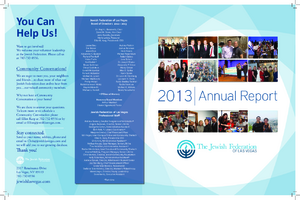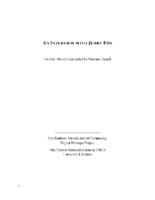Search the Special Collections and Archives Portal
Search Results

Daniel Tafoya oral history interview: transcript
Date
Archival Collection
Description
Oral history interview with Daniel Tafoya conducted by Laurents Bañuelos-Benitez and Barbara Tabach on December 12, 2018 for the Latinx Voices of Southern Nevada Oral History Project. In this interview, Tafoya discusses his early life in Albuquerque, New Mexico. He talks about his father's life story, his educational experience with learning disabilities, and joining the United States Air Force. Tafoya describes his career in the military, and being stationed at Nellis Airforce Base. Lastly, Tafoya discusses with involvement with the Clark County School District (CCSD) and with the Latin Chamber of Commerce.
Text

Pom Fritz oral history interview: transcript
Date
Archival Collection
Description
Oral history interview with Pom Fritz conducted by Kristel Peralta and Stefani Evans on June 8, 2021 for Reflections: The Las Vegas Asian American and Pacific Islander Oral History Project. Pom talks about her family and upbringing in Udon Thani, Thailand and her immigration to the United States with her second husband, an American citizen, in 1972. She discusses living on Air Force bases in North Carolina and California before moving to Las Vegas and finding work at different hotels. Pom shares her experiences as a member, steward, and executive board representative of the Culinary Workers Union and what she recalls from the Frontier Strike. She also talks about her children and grandchildren, some of whom still live in Thailand.
Text

Congregation Ner Tamid roundtable oral history interview: transcript
Date
Archival Collection
Description
Oral history interview with the Congregation Ner Tamid roundtable conducted by Barbara Tabach on September 21, 2016 for the Southern Nevada Jewish Heritage Project. In this interview, Rabbi Sanford Akselrad and five members of the congregation discuss the founding of Congregation Ner Tamid, the first reform synagogue in Las Vegas, Nevada, in 1974. They go into detail on how the synagogue was formed, the building-hopping they did until they built their current structure, and the funding it took to get to that point. The interviewees reveal a few donors, such as Morris Dalitz and Frank Sinatra, who helped to build their synagogue and school. The interview ends with meaningful stories and memories the members have relating to Congregation Ner Tamid.
Text
Valerie Wiener Papers
Identifier
Abstract
The Valerie Wiener Papers (approximately 1920-2023) document the life and career of former Nevada state senator, Valerie Wiener. Materials document her political career serving in the Nevada State Senate and working as the press secretary for Harry Reid congressional offices. The collection also includes materials that represent Wiener's work as a communications specialist through her consulting businesses and her nonprofit work. Other materials in this collection document Wiener's personal life including her childhood and family, educational experiences, and her spiritual practice.
Archival Collection

Meeting minutes for Consolidated Student Senate University of Nevada, Las Vegas, October 18, 1999
Date
Archival Collection
Description
Text

Annual Report of the Jewish Federation of Las Vegas, 2013
Date
Archival Collection
Description
Annual report from the Jewish Federation of Las Vegas for 2013.
Text

Transcript of interview with Mahamed Youssouf by Barbara Tabach, August 6, 2013 & August 13, 2013
Date
Archival Collection
Description
Ethiopian business owner Mahamed Youssouf became an American citizen in 1986. Born in Harar, Ethiopia, he recalls the hardships he had to endure during the Ethiopia-Somalia conflict. Coming from a family of tailors, he began making clothes with his father at a very early age. Mahamed’s recollections concerning his journey from political refugee to successful businessman demonstrates his resilience and determination to overcome obstacles and achieve his goals. Mahamed moved to Las Vegas, Nevada in 1985, where he rented a storefront in North Las Vegas. The name of his store was Uniform Plus and he focused mainly on making children’s clothes. His efforts proved lucrative as he began buying wholesale in Los Angeles, California, and selling clothes in Las Vegas on the weekends at the outdoor Swap Meet. After a fateful encounter, Mahamed became business partners with Eugene Hoffman, owner of Village East Cleaners. Mahamed firmly believes that communication is the key to socio-economic success. He views education as an investment and states that, “to have dialogue means better relationships.” When the Ethiopian government was overthrown, Mahamed returned home to Africa for a visit. He met his wife while there, got married, and started a family. Mahamed returned to America and bought a family home in Las Vegas. He dedicated his time to teaching his American born children more about Ethiopian culture and taught himself more about American culture— including the African-American experience in Las Vegas, racism, the Moulin Rouge, and the Westside.
Text

Transcript of interview with Elinor Horden by Valerie Fujii, February 13, 1930
Date
Archival Collection
Description
On February 13th, 1980, collector Valerie Fujii interviewed dancer, Elinor Horden, (born May 21st, 1930 in Ohio) at the University of Nevada, Las Vegas. This interview covers local entertainment in the 1950s and the social and environmental changes that have occurred in Las Vegas, Nevada.
Text

Transcript of interview with Gertrude Rudiak by Claytee White, January 11, 2007
Date
Archival Collection
Description
Gertrude (n?e Rightman) Rudiak was born in 1915 in North Dakota to Russian immigrants. She grew up in Wisconsin until 1924. That was the year the family drove to California via the Yellowstone Trail, a dusty, undeveloped road marked by yellow stones. In Los Angeles, her father practiced chiropractic, a holistic approach to well-being for which there was little knowledge at the time. Gertrude earned her music degree at University of California at Berkeley; a decision that did not lead to a career. She then attended a business college and got a job as a social worker in Northern California. In 1941, she met and soon married George Rudiak. It was the advent of World War II. George enlisted in the service and was assigned to Las Vegas Gunnery School (Nellis Air Force Base.) Since he had a law degree from University of California at Berkeley and passed the Nevada Bar exam, he found supplemental employment with local attorneys. Las Vegas became the Rudiaks? permanent home where they raised their five children. In this interview Gertrude recalls the stories of coming to live in Las Vegas of the 1940?s: their phone number was 1-2-3; the neighborhood they lived in longest being Scotch 80s and being part of the secular and Jewish communities.
Text

Transcript of interview with Jerry Fox by Barbara Tabach, November 12, 2014
Date
Archival Collection
Description
Interview with Jerry Fox by Barbara Tabach on November 12, 2014. In this interview, Fox discusses his father's restaurant, Foxy's Delicatessen, which opened on the Las Vegas Strip in the 1950s, and his own business endeavors including the Tinder Box and an embroidery business.
Jerry Fox grew up in Los Angeles until his family moved to Las Vegas in February 1955, where his father opened Foxy's Delicatessen, the city's first Jewish deli. Jerry would go on to follow in his father's entrepreneurial footsteps, operating several ventures across different industries, including his own restaurant, Foxy Dog. Jerry sold Foxy Dog in 1975 after going through a divorce, the same year that Foxy's Deli closed.
Text
